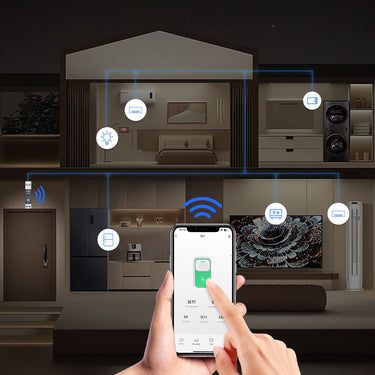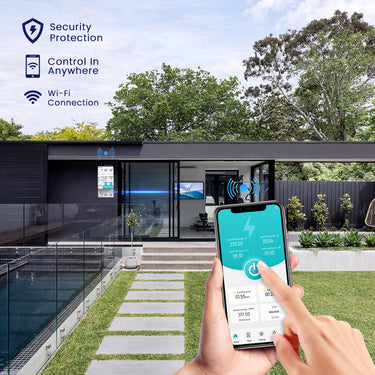Wifi vs Zigbee: How to Choose for Your Smart Home

In the burgeoning age of smart homes, choosing the right communication protocol for your devices is more than a matter of preference—it's about performance, reliability, and the seamless integration of technology into our lives. Two of the most prominent players in this arena are WiFi and Zigbee. Each brings its unique strengths to the table, but understanding their differences and applications can help you make an informed decision on which is best suited for your smart home needs.
What is Zigbee?
Zigbee is a wireless technology developed as an open global standard to address the unique needs of low-cost, low-power wireless IoT networks. It operates on the IEEE's 802.15.4 personal-area network standard and is designed for a wide range of applications requiring low data rates and battery life conservation. It's often praised for its ability to create large mesh networks containing thousands of devices.
What is WiFi?
WiFi, or Wireless Fidelity, operates on the IEEE's 802.11 standard and is the most widely used wireless communication technology. It's designed to provide high-speed internet and network connections to various devices without the need for physical wires. Unlike Zigbee, WiFi is geared towards high data rate applications such as streaming videos, browsing the internet, and transmitting large files.
Zigbee VS Wifi, the Differences
| Feature | Zigbee | WiFi |
| Power Consumption | Low | High |
| Range | Approximately 10-100 meters | Approximately 50 meters indoors |
| Network Topology | Mesh | Star |
| Application | Low data rate applications | High data rate applications |
When to Use Zigbee: Pros and Cons
Pros:
Low Power Consumption: Ideal for battery-operated devices such as sensors and smart locks.
Mesh Networking: Allows for long-range communication through the network's devices, enhancing reliability.
High Device Capacity: Can support thousands of nodes in a single network.
Cons:
Lower Data Rate: Not suitable for applications requiring high bandwidth.
Compatibility: May require a specific hub or gateway to connect Zigbee devices to the internet.
When to Use WiFi: Pros and Cons
Pros:
High Data Speeds: Ideal for bandwidth-hungry applications like streaming video or online gaming.
Ubiquity: WiFi is universally adopted, making it easily accessible and compatible with a wide range of devices.
Ease of Use: Setting up a WiFi network is straightforward for most consumers.
Cons:
Power Consumption: It consumes more power, making it less ideal for devices powered by batteries.
Range Limitations: Without extenders, the range may be limited, especially in structures with thick walls.

Making the Choice: Which Path for Your Tongou Smart Devices?
So, which protocol is best for your Tongou Smart switches and breakers?
Choose Tongou Smart WI-FI Switches & Breakers IF:
-
You prefer simplicity and easy setup: Direct connection to your router means less hassle.
-
You're starting small: Adding just a few smart switches or breakers? Wi-Fi is often the most straightforward path.
-
You don't want to buy an extra hub: Keep your setup lean and potentially lower initial cost.
-
Your home Wi-Fi is generally reliable: For most homes, Wi-Fi provides excellent performance for mains-powered smart devices.
Consider Zigbee (and check Tongou Smart compatibility) IF:
-
You already have a Zigbee hub: Integrate seamlessly with your existing ecosystem.
-
You plan a very large smart home system (50+ devices): Zigbee's mesh network might offer better stability at scale.
-
Your home Wi-Fi is heavily congested: A separate Zigbee network can sometimes help.
-
You need extended range in a very large property: The mesh can help, but good Wi-Fi coverage often suffices.

Why Choose Tongou Smart – Beyond the Protocol
Whether you lean towards the simplicity of Wi-Fi or the mesh capabilities of Zigbee, choosing Tongou Smart brings key advantages:
- Official Tuya Partnership for Future-Proofing: We are proud to be an official partner of Tuya, a leading global IoT platform. This strategic collaboration ensures that your Tongou Smart switches and breakers benefit from consistent, stable updates and seamless integration within the widely-used Tuya ecosystem. You can invest with confidence, knowing your devices will receive ongoing support and remain compatible with future advancements.
- Quality & Reliability: We prioritize robust components and manufacturing standards for devices you can depend on. Our smart circuit breakers meet critical safety certifications.
-
User-Friendly Control: Our devices often integrate with popular apps [Mention App Names like Tuya/Smart Life if applicable] known for their ease of use, allowing intuitive scheduling, remote control, and monitoring.
-
Essential Features: Benefit from features like remote on/off, scheduling, timers, and potentially energy monitoring (check specific product features) to enhance convenience and efficiency.
-
Excellent Value: Get advanced smart home control and safety features at an accessible price point.
People Also Ask
Q: Can WiFi and Zigbee devices work together in a smart home?
A: Yes, with the appropriate hub or gateway, WiFi and Zigbee devices can coexist and complement each other in a smart home environment.
Q: Which is more secure, WiFi or Zigbee?
A: Both WiFi and Zigbee offer robust security features. However, WiFi's WPA3 security is considered more advanced, albeit Zigbee also provides strong AES-128 encryption.
Q: Do I need the internet for Zigbee to work?
A: No, Zigbee devices can communicate with each other in a mesh network without internet. However, access to internet-dependent services will require a gateway.
Choosing between WiFi and Zigbee for your smart home depends on your specific needs—whether it's the high-speed connectivity of WiFi for media devices or the low-power, extensive network capabilities of Zigbee for sensors and controls. By considering the pros and cons of each, you can prioritize what matters most for your smart home's functionality and convenience.












Leave a comment
Please note, comments need to be approved before they are published.